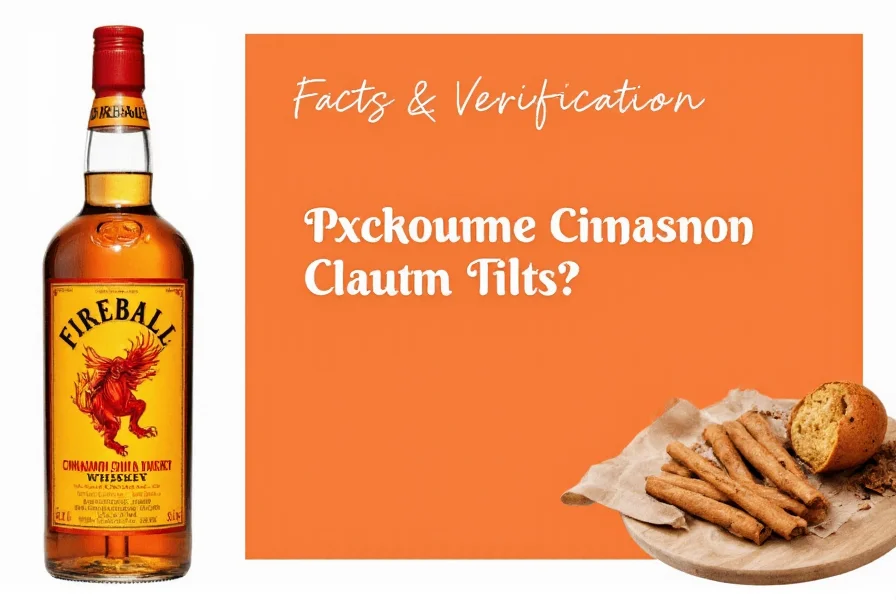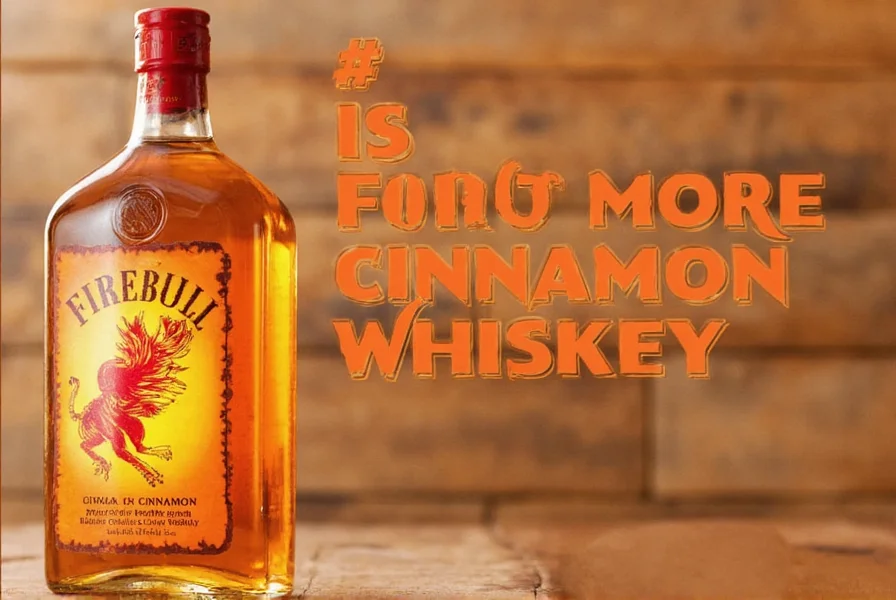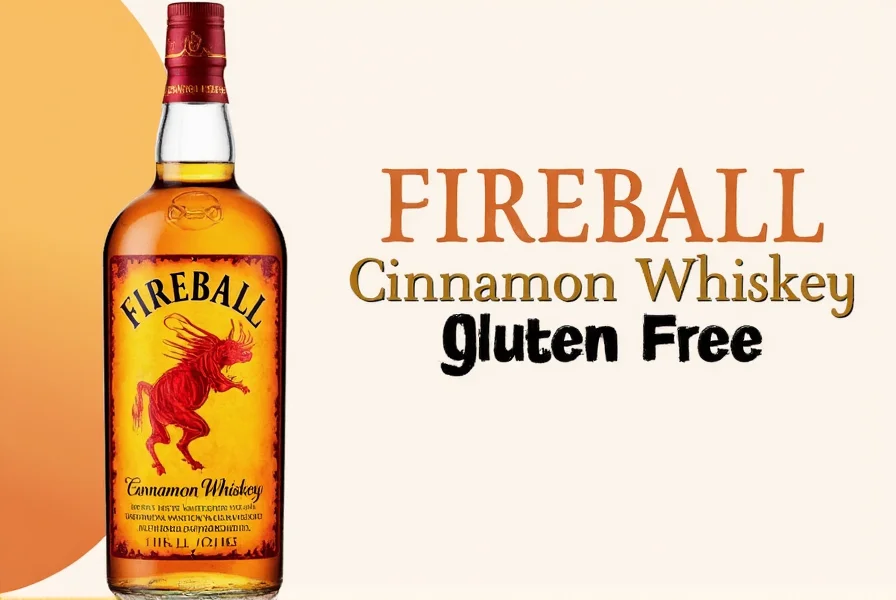When examining whether Fireball Cinnamon Whiskey contains gluten, it's essential to understand both the production process and regulatory landscape surrounding gluten labeling in alcoholic beverages. The straightforward answer to "is Fireball cinnamon whiskey gluten free" is yes—based on its manufacturing process—though with important qualifications that matter for those with gluten sensitivities.
Fireball Whiskey, produced by the Sazerac Company, uses a distillation process that begins with gluten-containing grains but ultimately removes gluten proteins through multiple distillation stages. According to the manufacturer's official statements, Fireball does not contain gluten ingredients and is processed to remove gluten. However, the product isn't certified gluten-free or labeled as such due to Alcohol and Tobacco Tax and Trade Bureau (TTB) regulations that prevent distilled spirits from making gluten-free claims, even when testing shows no detectable gluten.
Understanding Gluten in Distilled Spirits
The science behind gluten in distilled spirits is often misunderstood. During distillation, the alcohol is separated from the mash, which theoretically removes gluten proteins. The TTB states that distilled spirits made from gluten-containing grains cannot be labeled "gluten-free" because they originated from gluten sources, despite scientific evidence showing that properly distilled spirits contain no detectable gluten.
Independent laboratory testing of Fireball Cinnamon Whiskey has consistently shown gluten levels below 5 parts per million (ppm)—well under the 20 ppm threshold considered safe for most people with celiac disease by the FDA. However, individual reactions can vary, particularly among those with extreme sensitivity.
Fireball's Official Position on Gluten
On their official website, Fireball states: "Our whiskey is distilled from grain, but the distillation process removes the gluten. While we don't test for gluten, our process is designed to create a gluten-free product." This careful wording reflects both the scientific reality and regulatory constraints facing distilled spirits producers.
Unlike beer or malt beverages, which retain gluten proteins, distilled spirits like Fireball undergo a process that separates alcohol from other components. The final product contains ethanol, water, natural and artificial flavors, and caramel color—none of which contain gluten.
| Product | Gluten Status | Testing Results | Manufacturer Statement |
|---|---|---|---|
| Fireball Cinnamon Whiskey | Processed to be gluten-free | <5 ppm gluten | "Distillation process removes gluten" |
| Traditional Beer | Contains gluten | High levels | N/A |
| Certified Gluten-Free Beer | Gluten-free | <20 ppm | "Certified gluten-free" |
| Other Distilled Spirits | Processed to be gluten-free | Typically <5 ppm | Varies by brand |
Considerations for People with Celiac Disease
While Fireball Cinnamon Whiskey is processed to remove gluten, those with celiac disease should consider several factors:
- Individual sensitivity varies - Some people with celiac disease report reactions to distilled spirits despite testing showing no gluten
- Cross-contamination risks - Though unlikely in properly manufactured products, facility practices matter
- Flavoring ingredients - Some cinnamon whiskeys use flavorings that might contain gluten, but Fireball's formulation does not
- Regulatory limitations - The TTB prohibits "gluten-free" labeling for distilled spirits regardless of test results
For those with extreme gluten sensitivity, consulting with a gastroenterologist before consuming Fireball or similar products is advisable. Many celiac organizations recognize that properly distilled spirits are generally safe, but individual medical advice should always take precedence.

How Fireball Compares to Other Cinnamon Whiskeys
When evaluating "is fireball cinnamon whiskey gluten free" compared to competitors, most major cinnamon whiskey brands follow similar production processes:
- Fireball - Made from distilled corn, rye, and barley, but processed to remove gluten
- Goldschläger - Contains actual gold flakes but is also distilled from gluten grains with gluten removed
- Jack Daniel's Tennessee Fire - Similar distillation process from gluten grains
None of these products can legally claim to be "gluten-free" on their labels due to TTB regulations, though all are processed to remove gluten through distillation. Independent testing generally shows gluten levels below detection limits for all major brands.
Expert Recommendations for Gluten-Sensitive Consumers
Dietitians specializing in celiac disease generally agree that distilled spirits like Fireball Cinnamon Whiskey are safe for most people with gluten sensitivities. The Celiac Disease Foundation states: "Distilled alcohol is considered gluten-free. It does not matter what the original grain is, as the distillation process removes all proteins (including gluten)."
However, they also caution that:
- Flavored spirits with added ingredients after distillation may contain gluten
- Individual reactions can occur despite scientific evidence
- "Gluten-removed" beers are not considered safe for celiac disease
For those strictly following a gluten-free diet for medical reasons, discussing alcohol consumption with a healthcare provider remains the safest approach when considering "is fireball whiskey gluten free for celiac disease" concerns.

Practical Guidance for Gluten-Free Consumers
If you're following a gluten-free diet and wondering "does fireball cinnamon contain gluten," here are practical steps to take:
- Check for third-party testing if available (though rare for distilled spirits)
- Contact the manufacturer directly with specific questions
- Start with small amounts if trying for the first time
- Monitor your body's reaction carefully
- Consult with a dietitian specializing in gluten-related disorders
Remember that "gluten-free" labeling requirements differ between food and alcoholic beverages. While FDA-regulated foods can be labeled gluten-free at 20 ppm or less, TTB regulations prevent distilled spirits from making this claim regardless of actual gluten content.











 浙公网安备
33010002000092号
浙公网安备
33010002000092号 浙B2-20120091-4
浙B2-20120091-4